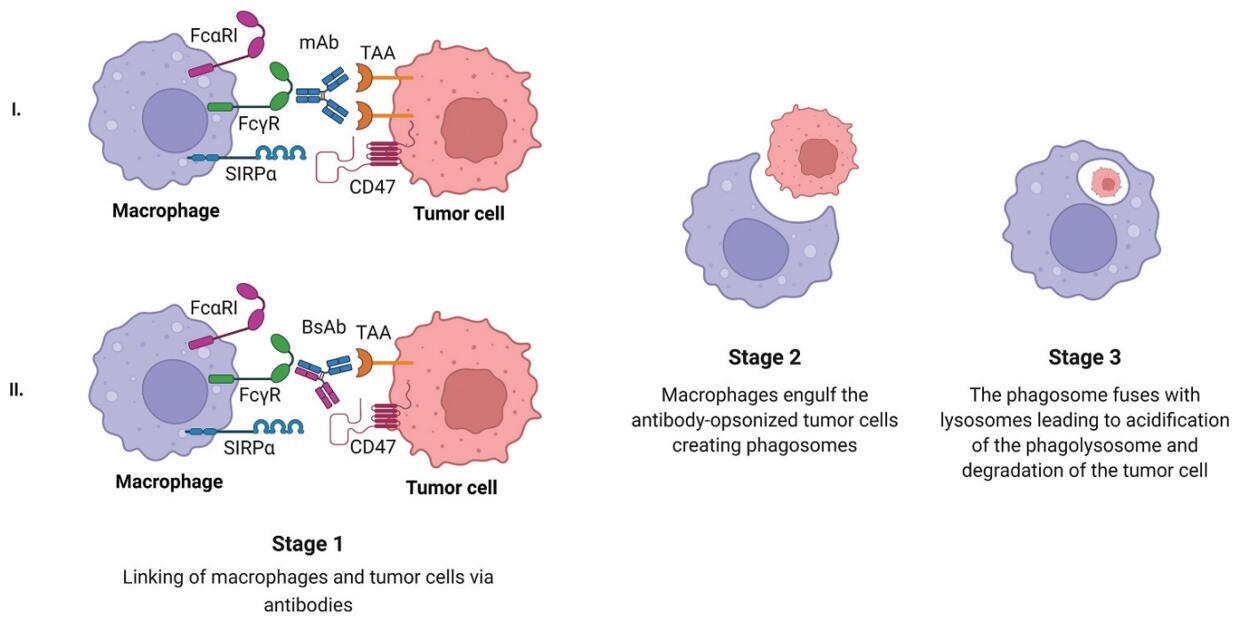Antibody-dependent cell-mediated phagocytosis (ADCP) is a process in which immune cells called phagocytes, such as macrophages and neutrophils, engulf and destroy target cells labeled with antibodies. This process is initiated when specific antibodies bind to antigens on the surface of target cells. The Fc region of the bound antibodies then interacts with Fc receptors on the phagocyte, triggering the phagocytosis process.
Once the target cells are engulfed by the phagocytes, they are transported to intracellular compartments called phagosomes. Within the phagosome, the target cells are exposed to various antimicrobial mechanisms, including the production of reactive oxygen species and the release of antimicrobial peptides and enzymes. These processes ultimately lead to the destruction and clearance of the target cells from the body.
 Figure 1. Antibody-dependent cellular phagocytosis by macrophages. Antibodies (mAbs (I) and BsAbs (II)) can link macrophages and tumor cells, resulting in antibody-dependent cellular phagocytosis (ADCP) (stage 1). ADCP is enhanced in the presence of anti-checkpoint BsAb (II). Engulfment of antibody-opsonized tumor cells by macrophages creates a phagosome (stage 2), after which the phagosome fuses with lysosomes, forming an acidic environment in the phagolysosome (stage 3). This in turn leads to degradation of the tumor cell.
Figure 1. Antibody-dependent cellular phagocytosis by macrophages. Antibodies (mAbs (I) and BsAbs (II)) can link macrophages and tumor cells, resulting in antibody-dependent cellular phagocytosis (ADCP) (stage 1). ADCP is enhanced in the presence of anti-checkpoint BsAb (II). Engulfment of antibody-opsonized tumor cells by macrophages creates a phagosome (stage 2), after which the phagosome fuses with lysosomes, forming an acidic environment in the phagolysosome (stage 3). This in turn leads to degradation of the tumor cell.
Creative Bioarray offers an innovative ADCP assay that allows researchers to evaluate the efficacy of therapeutic antibodies, assess their optimal dosage, and optimize their functional activity.
In this assay, Creative Bioarray ensures the use of high-quality and properly characterized effector cells, target cells, and antibodies. Various readout methods, such as flow cytometry or microscopy, can be employed to quantify and assess the level of phagocytosis. The results obtained from this assay provide important information on the antibody's ability to facilitate phagocytosis, its binding affinity, and its functionality in enhancing immune responses.
Reference:
1. Sewnath CA, Behrens LM, van Egmond M. Targeting myeloid cells with bispecific antibodies as novel immunotherapies of cancer. Expert Opin Biol Ther. 2022;22(8):983-995. doi:10.1080/14712598.2022.2098675
Online Inquiry